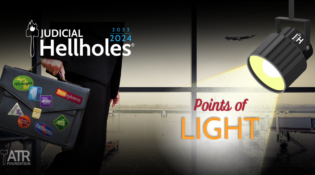Federal Appeals Court Upholds Mississippi’s Million-Dollar Limit on ‘Pain and Suffering’ Awards
In a victory for reasonableness, the U.S. Circuit Court of Appeals for the Fifth Circuit this week upheld Mississippi’s $1 million limit on awards for noneconomic damages.
Despite the Mississippi Supreme Court’s previous recalcitrance to rule on the constitutionality of the statutory limit on noneconomic damages, the Fifth Circuit’s decision in Lisa Learmonth v. Sears, Roebuck & Co. makes clear that the limit, enacted in 2004, does not violate the state constitution’s separation of powers:
“By its very nature, non-procedural law affects judicial functions. . . . To accept that the constitutional separation of powers prohibits the legislature from limiting a legal remedy would be to prohibit the legislature from enacting practically any change to substantive law. . . . The statute’s command that a judge ‘shall’ limit a noneconomic damages judgment is tantamount to a command that a judge shall apply substantive law. This legislative authority does not represent an impermissible intrusion on any judicial function.”
Among other elements of its decision, the federal court also rejected the reasoning of a minority of courts that have struck down noneconomic damages limits as a violation of the right to trial by jury, finding that “this line of decisions seems to contradict ‘the usual notion that the law prescribes the remedy and its measure.’” (quoting Dobbs, Law of Remedies 8.8 n.23 (2d ed. 1993)).
Equally dismissive of the plaintiff’s contention that statutory limits on damages are precluded by the Mississippi Constitution’s reference to the “inviolate” right to a jury trial, the federal court pointed out that “‘inviolability simply’ means that the jury trial right is protected absolutely in cases where it applies; the term does not establish what that right encompasses.”
As reported by Law360.com, Magnolia State Gov. Phil Bryant had urged the Fifth Circuit to uphold the million-dollar limit, saying it was crucial to reducing insurance premiums, boosting local economies and keeping the state from again becoming known as a “judicial hellhole.”
Commonsense limits on inherently subjective awards for so-called “pain and suffering” provide much needed guidance to juries that might otherwise be susceptible to the heart-string pluckings of silver-tongued trial lawyers hoping to get rich beyond their wildest contingency-fee dreams. By reducing the likelihood of runaway verdicts, limits on noneconomic damages lessen defendants’ fear of going to trial and thus lessen the motivation for plaintiffs’ lawyers to pursue meritless lawsuits in the first place.






